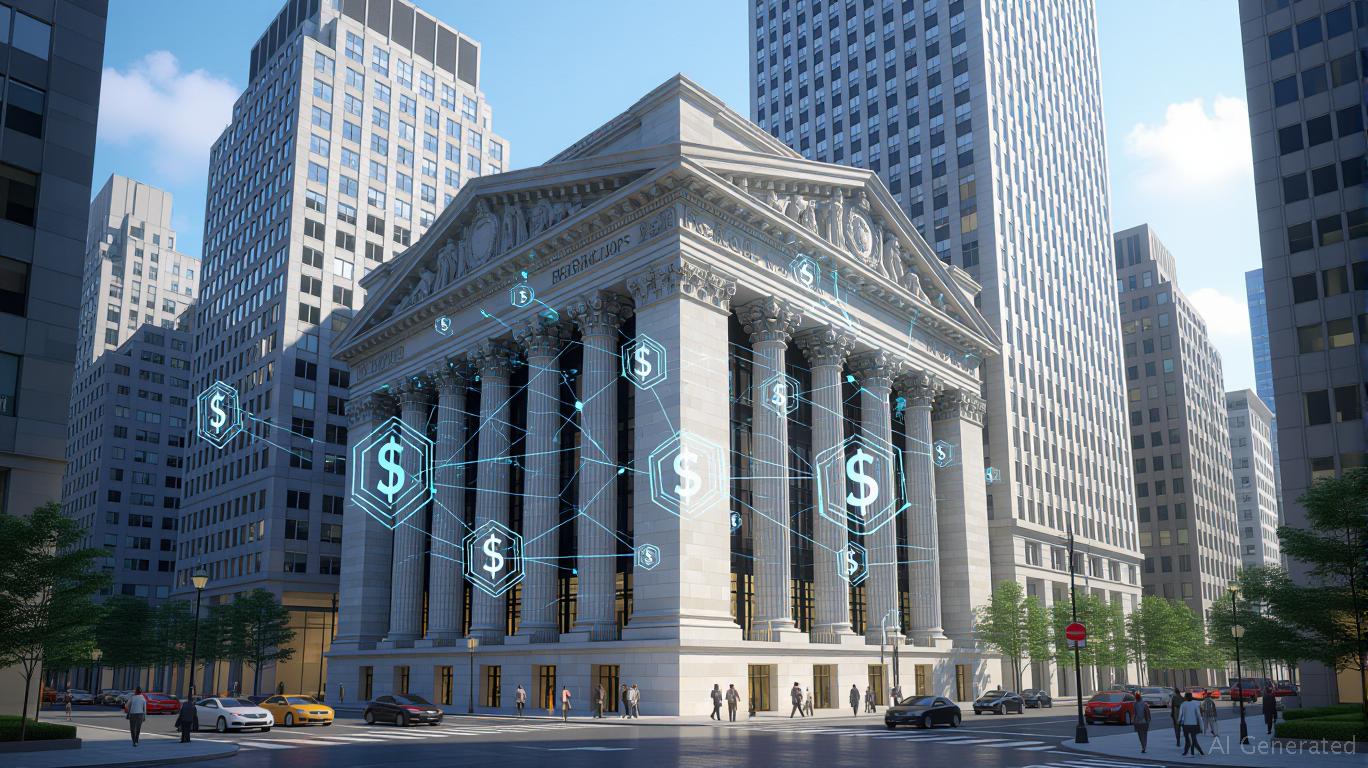BNY Mellon's Stablecoin Custody Dominance: A Beacon for Institutional Crypto Adoption
Philip CarterWednesday, Jul 9, 2025 11:49 pm ET
![]() 3min read
3min read
BNY Mellon, the world's oldest global bank, is quietly cementing its position as the linchpin of institutional crypto adoption through its leadership in stablecoin custody. As digital assets transition from speculative instruments to mainstream financial tools, BNY's strategic partnerships, regulatory foresight, and infrastructure expertise are positioning it to capitalize on a $200 billion stablecoin market expected to grow exponentially by 2030. This article explores how BNY's early moves—paired with legislative clarity from the —make it a top financial stock for long-term investors.

The , set to pass Congress by late 2025, is the clearest legislative milestone for stablecoin regulation. It mandates that issuers maintain 100% reserves of high-quality liquid assets (e.g., U.S. Treasuries) and undergo rigorous audits—a framework BNY Mellon already enforces for clients like . BNY's partnership with Ripple, announced in Q3 2025, exemplifies this compliance-first approach: the bank's custody of RLUSD reserves ensures transparency and adherence to NYDFS's Trust Company Charter, a regulatory gold standard.
BNY's stock has outperformed the broader market by 15% since 2023, reflecting investor confidence in its digital asset strategy. The GENIUS Act's passage will further solidify its position as a , attracting institutional clients wary of unregulated crypto platforms.
BNY's custody role for Ripple's is not merely a transactional relationship—it's a blueprint for institutional-grade stablecoin infrastructure. By managing RLUSD's reserves (backed by Treasuries and money market funds) and providing transaction banking services, BNY ensures critical for cross-border payments. This partnership has already boosted RLUSD's market cap to over $500 million, with institutional demand surging as banks and corporates seek stablecoin-based liquidity solutions.
While the text notes no explicit BNY-USDC partnership, its approach with Ripple sets a precedent. Competitors like rely on similar custodial frameworks, but BNY's century-old credibility and global reach give it an edge in attracting issuers seeking . As stablecoin adoption expands, BNY's early-mover advantage will amplify its market share.
BNY's dominance stems from its ability to integrate stablecoin custody into its core services. For institutional clients, this means:
- : BNY's $53.1 trillion custody infrastructure ensures seamless conversions during minting and redemption.
- : BNY's legal teams assist clients in navigating the GENIUS Act's requirements, from reserve audits to AML compliance.
- : Its global network reduces the friction of using stablecoins for international settlements, a $20 trillion annual market.
This infrastructure has spurred what analysts call : a surge in partnerships between traditional firms (e.g., Walmart, Uber) and digital asset platforms, all seeking BNY's expertise.
BNY Mellon is uniquely positioned to profit from two converging trends:
1. : Institutional adoption of stablecoins is projected to grow at 35% CAGR through 2030, driven by corporate treasury use and central bank digital currency (CBDC) integration.
2. : The GENIUS Act's passage will eliminate ambiguity, pushing issuers toward custodians like BNY that already meet its standards.
BNY's geographic reach and regulatory relationships (e.g., NYDFS, OCC) make it the for stablecoin issuers. This creates recurring revenue streams through custody fees, transaction services, and advisory contracts—a moat no crypto-native firm can match.
However, BNY's head start and institutional trust mitigate these risks. Its 240-year history and role as a make it the safest bet for cautious institutions.
BNY Mellon's strategic moves—Ripple's RLUSD partnership, GENIUS Act compliance, and infrastructure scalability—make it a in the $200 billion stablecoin market. For investors, BNY is a play on the inevitable mainstreaming of crypto, offering stable returns with minimal direct exposure to crypto volatility.
: Add BNY Mellon to your portfolio as a long-term holding. With a P/E ratio of 12.5 (vs. 14.1 for peers) and a 2.5% dividend yield, it offers value amid rising stablecoin adoption. Pair it with for beta exposure, but let BNY anchor your “digital finance” theme.
The future of finance is hybrid—traditional meets blockchain—and BNY Mellon is writing the playbook.
You may also like...
Diddy's Legal Troubles & Racketeering Trial

Music mogul Sean 'Diddy' Combs was acquitted of sex trafficking and racketeering charges but convicted on transportation...
Thomas Partey Faces Rape & Sexual Assault Charges

Former Arsenal midfielder Thomas Partey has been formally charged with multiple counts of rape and sexual assault by UK ...
Nigeria Universities Changes Admission Policies

JAMB has clarified its admission policies, rectifying a student's status, reiterating the necessity of its Central Admis...
Ghana's Economic Reforms & Gold Sector Initiatives

Ghana is undertaking a comprehensive economic overhaul with President John Dramani Mahama's 24-Hour Economy and Accelera...
WAFCON 2024 African Women's Football Tournament

The 2024 Women's Africa Cup of Nations opened with thrilling matches, seeing Nigeria's Super Falcons secure a dominant 3...
Emergence & Dynamics of Nigeria's ADC Coalition

A new opposition coalition, led by the African Democratic Congress (ADC), is emerging to challenge President Bola Ahmed ...
Demise of Olubadan of Ibadanland
Oba Owolabi Olakulehin, the 43rd Olubadan of Ibadanland, has died at 90, concluding a life of distinguished service in t...
Death of Nigerian Goalkeeping Legend Peter Rufai

Nigerian football mourns the death of legendary Super Eagles goalkeeper Peter Rufai, who passed away at 61. Known as 'Do...


